Looking to know the product manager’s salary? Keep on reading then.
It’s hard to find stellar product managers. Due to that scarcity, employers are eager to attract product managers through generous compensation. The software product manager role commands high salaries, strong equity, excellent bonuses, and a powerful career track in tech. On top of that, they get to set the product vision and mission, drive the roadmap, craft the product strategy, work alongside software engineers, and grow their product development teams to new heights.
But the question is, just how much does a product manager make?
Product management is highly contextual. Product manager salaries are highly contextual as well because the value of the product manager to the employer depends heavily on the context of that role.
For example, some companies value technical product managers very highly, whereas other companies value business-oriented product managers very highly. Different companies will pay differently for different kinds of product managers.
So, here’s how to best determine a fair salary for the context in which you’re seeking it. Note that I’m not affiliated with any of the below companies – I’m simply sharing what’s worked for me.
How to determine Market Compensation as a Product Manager?
Glassdoor has powerful anonymous compensation analytics, so start there to build up your knowledge of product manager salaries.
The most important factor to account for is geography.
Why is that? First, geography significantly impacts the cost of living, and customers and employers take the cost of living into account. It’s not wise to use the national average, because each geography is so different from one another.
For example, a product manager at Google, Amazon, or Salesforce might make a hefty sum in San Francisco, but they might not make as much in some other geography.
Second, demand and supply for product managers differ from geography to geography, and each local geography values product managers differently.
Looking to become a product manager? Enroll in our top-rated product manager certification courses to do just that:
Product Manager Salary Distributions across the World
Here are different distributions of product manager salaries in different regions across the world:
Product Manager Salaries in San Francisco, CA
As an example, here’s the distribution of product manager salaries in San Francisco, CA:
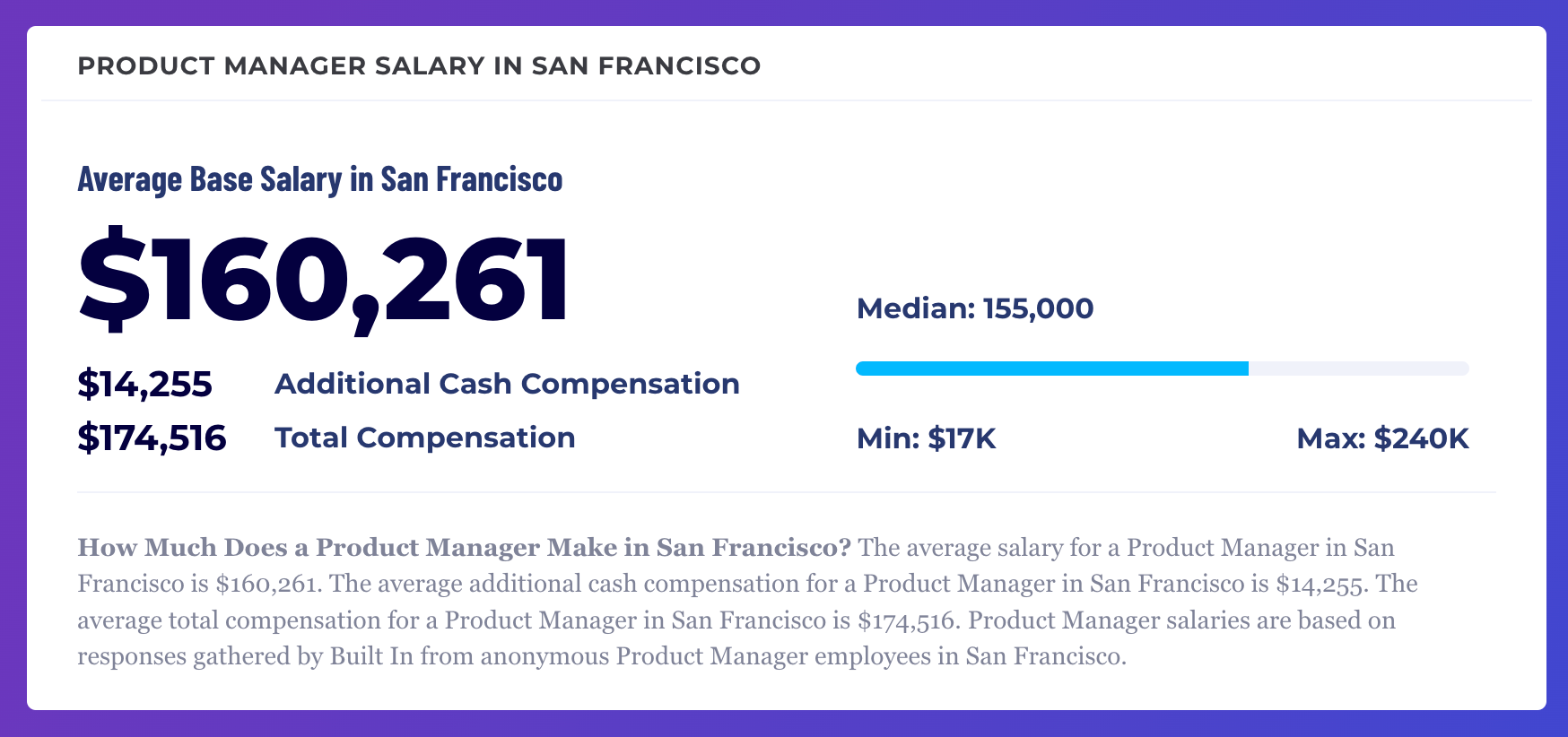

Credits: Builtinsf
Product Manager Salaries in Denver, CO
Here’s the distribution of product manager salaries in Denver, CO:
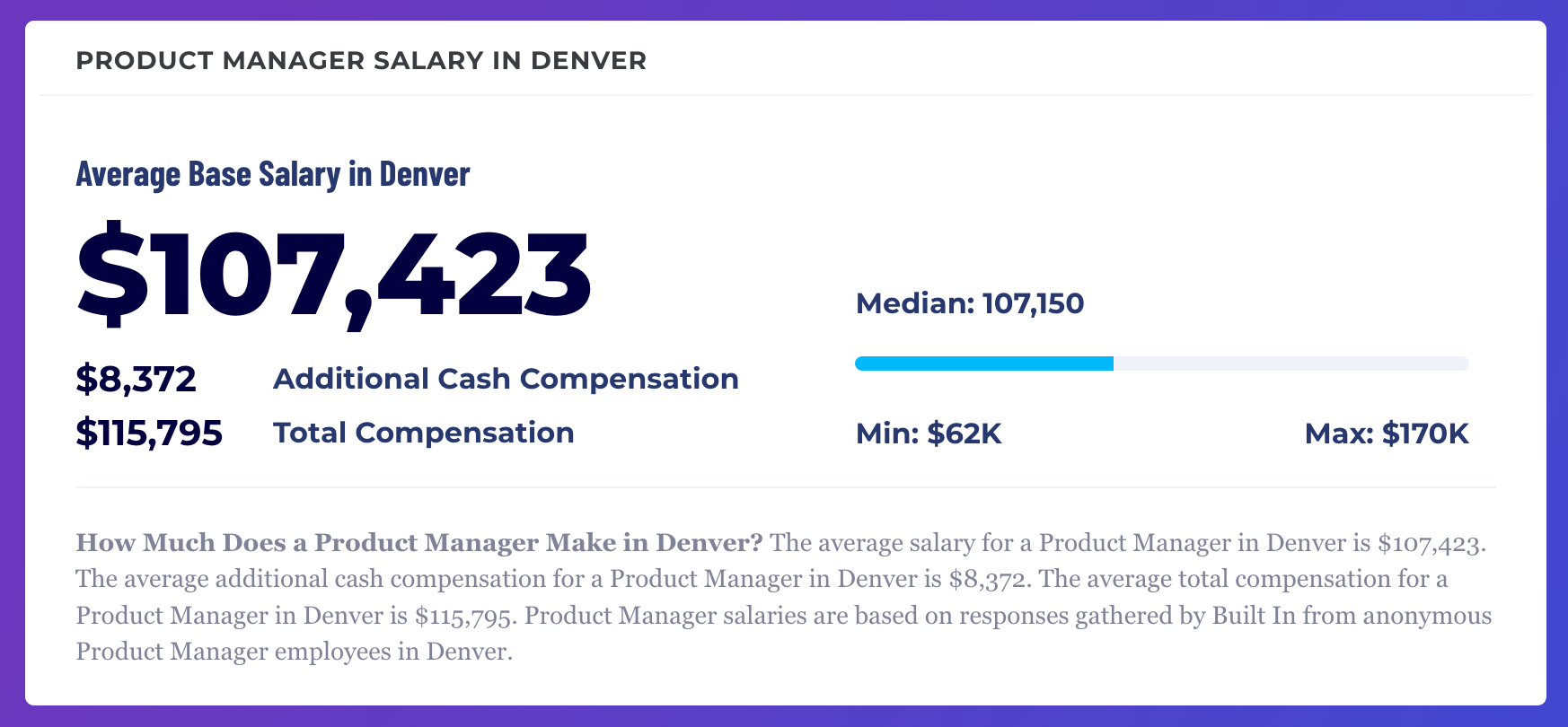

Credits: Builtinsf
Product Manager Salaries in New York, NY
Here’s the distribution of product manager salaries in New York, NY:
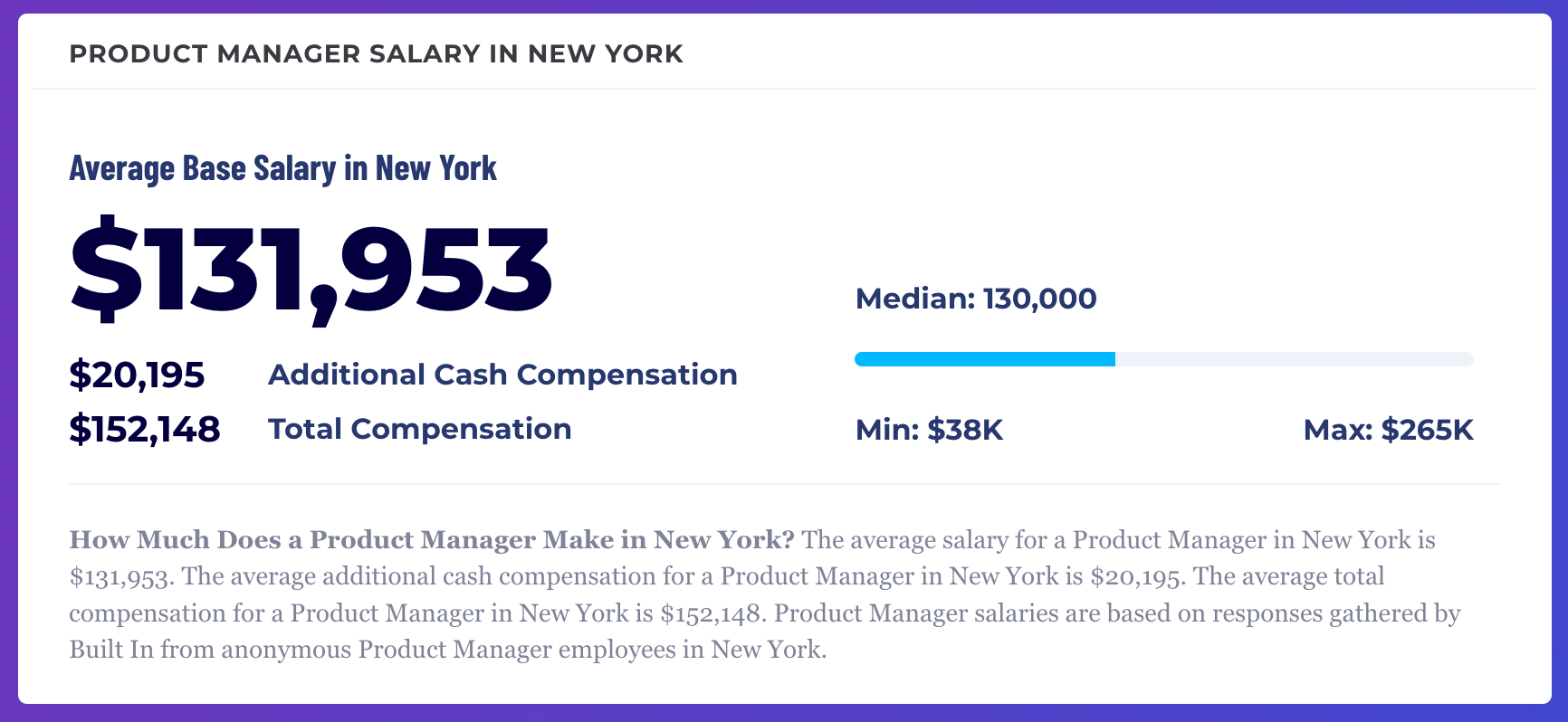

Credits: Builtinsf
Product Manager Salaries in Seattle, WA
Here’s the distribution of product manager salaries in Seattle, WA:
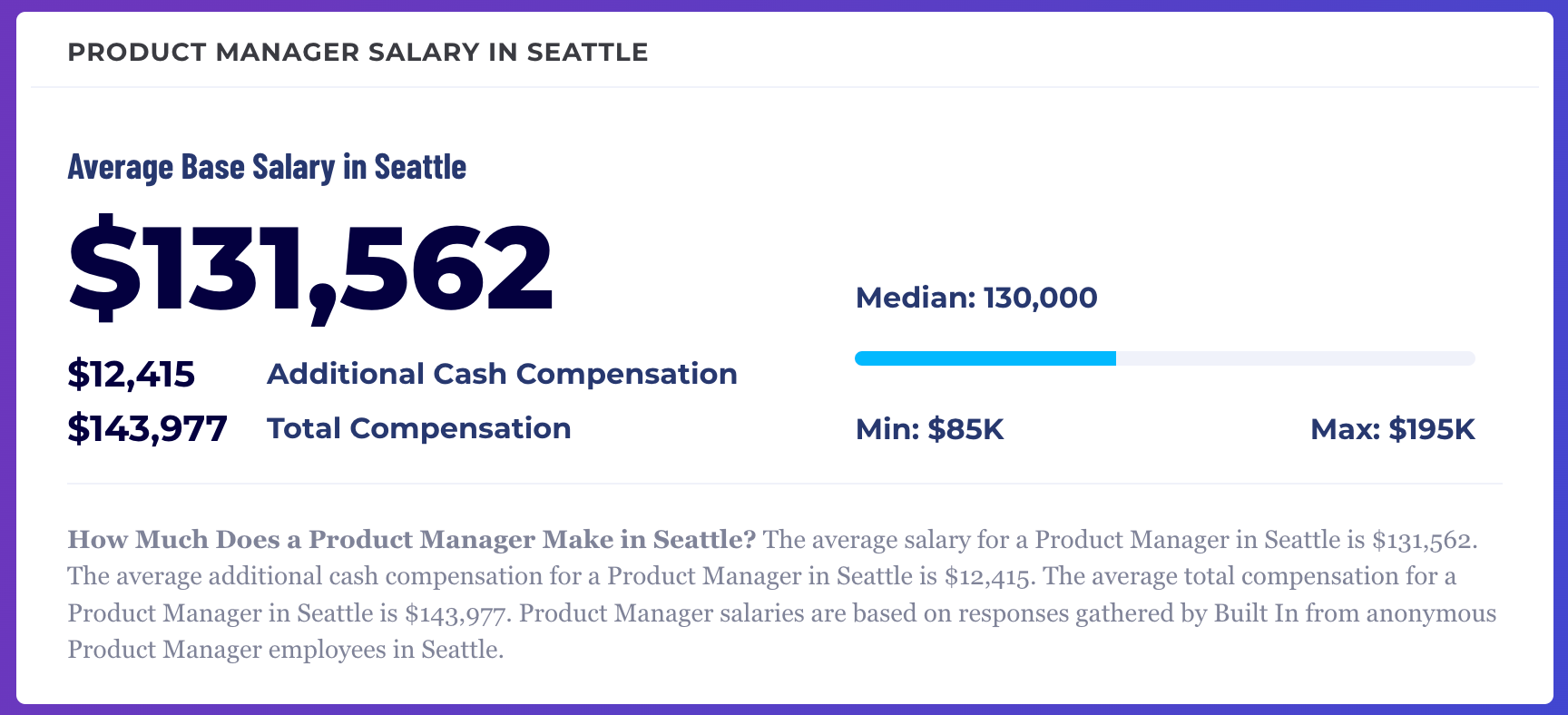

Credits: Builtinsf
Product Manager Salaries in Los Angeles, CA
Here’s the distribution of product manager salaries in Los Angeles, CA:
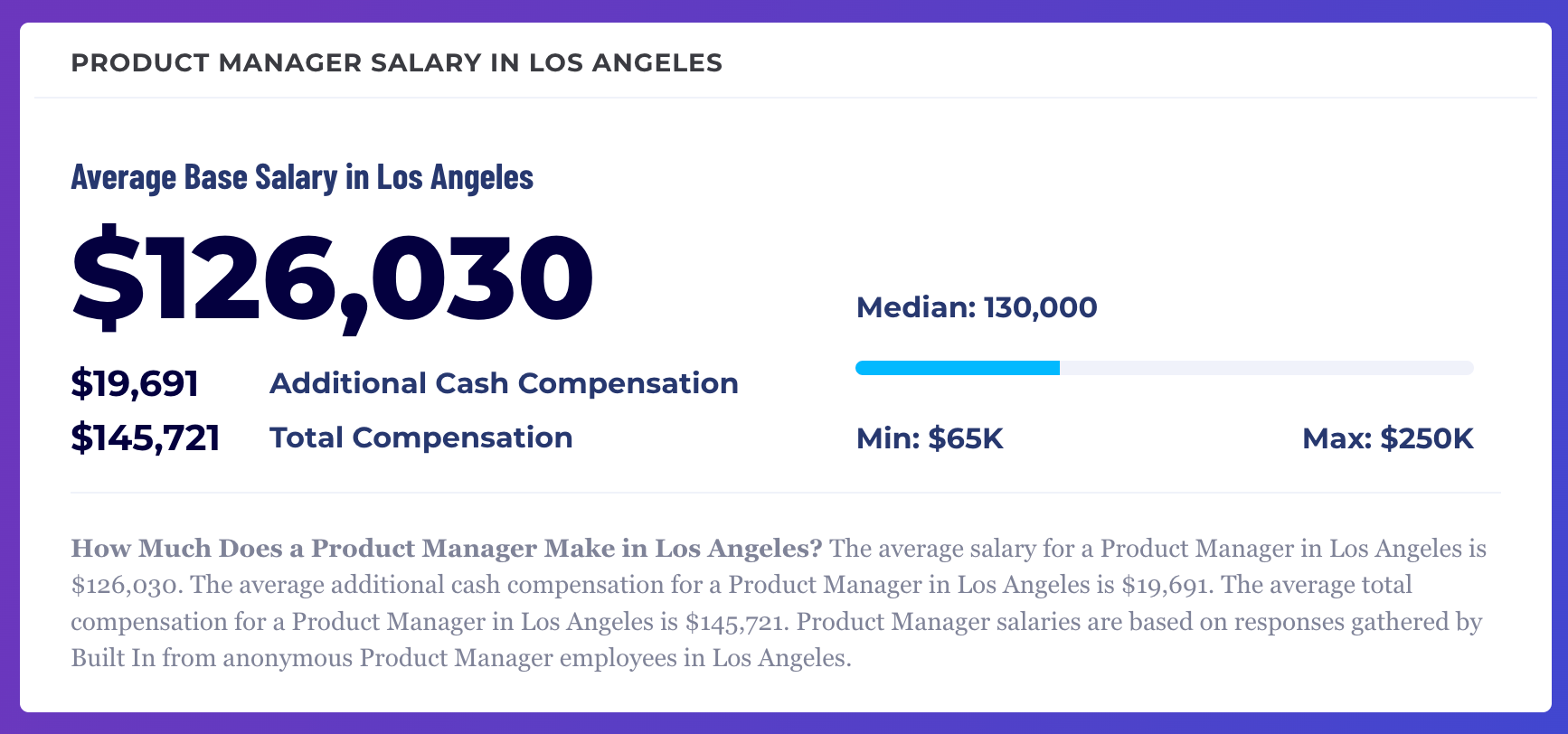

Credits: Builtinsf
Product Manager Salaries in London, England
Outside the United States, here’s the distribution of product manager salaries in London, England:


Credits: Reed.co.uk
Product Manager Salaries in Toronto, Canada
Here’s the distribution of salaries in Toronto, Canada:


Credits: Indeed
Product Manager Salaries in Bangalore, India
And here’s the distribution of salaries in Bangalore, India:


Credits: Payscale
Once you’ve selected a geography to focus on, layer in other factors such as the industry that you’re targeting, the size of the team, the company that you’re targeting, and your years of experience.
For example, here’s a view that would be relevant to someone who works in fintech in San Francisco:
Another thing to keep in mind is that every company assesses the seniority of product managers differently and that each company has a different philosophy and process when it comes to compensating for seniority.
Therefore, it’s helpful to dive into results at different levels of seniority. For example, you’ll want to look at the average salary for an associate product manager, a product manager, a senior product manager, and a director of product management. That way, you’ll get a strong grasp of the compensation trajectory and how that salary increase correlates with your job title.
One thing to keep in mind – it can be different to understand what compensation for chief product officers (a.k.a. CPO) looks like. It’s hard to know their average base salary because there aren’t as many chief product officers as there are product managers. Ask around the PMHQ community to get their opinions on the right PM compensation too.
Again, use the breakdowns that I’ve mentioned above to get a good sense of relevant product manager jobs and salary ranges:
- Geography
- Industry
- Years of experience
- Seniority
LinkedIn has uniquely insightful cuts of average product manager salary data – for example, it provides a view into how company size, industry, education level, and field of study impact pay for product managers.
A word of caution: the “education level” cut can sometimes be misleading. There are far more MBAs in the product than there are JDs or MDs, and LinkedIn doesn’t report on bachelor’s degrees.
For context, in all of the organizations that I’ve previously worked in, the vast majority of product managers had bachelor’s degrees.
One other resource I like to rely on is WellFound since it enables you to cross-reference compensation for open product manager roles. AngelList is unique in that it provides a view into both salary and stock options, so it’s a better proxy for total compensation.
Company-Specific Compensation for Product Managers
One thing to note is that product managers are compensated differently from organization to organization, even within the same market. That means you’ll have to do deeper market research to understand what’s fair for the person, particular role, and employer that you’re targeting.
Using the above resources – Glassdoor, LinkedIn, and AngelList – filter down to the company that you’re targeting. That filter will provide you and your clients with a much clearer view of what sort of average total compensation you can expect from that specific employer.
FAQs
Here are answers to questions regarding a product manager position:
Is product manager a high-paying job?
Yes, being a sales or product manager is considered a high-paying job, especially in the technology and finance sectors. Their compensation often includes base salary, bonuses, and stock options, making it a lucrative career choice.
What is a product manager’s salary in the US?
In the US, the salary for a product manager typically ranges from $95,000 to $150,000 annually, depending on factors like experience, industry, and location. Product managers in tech hubs like Silicon Valley can earn significantly more, with total compensation often exceeding $200,000.
What do product managers earn?
Product managers earn competitive salaries, generally between $95,000 and $150,000 per year in the US. Senior product managers and those in high-demand industries can see even greater earnings, reflecting the importance and complexity of their roles.
Is an MBA required for a product manager?
An MBA is not strictly required to become a product manager, but it can be beneficial. While an MBA can provide valuable business acumen and networking opportunities, the relevant experience and skills you learn from a bachelor’s degree in project management are often equally important for developing and securing a product manager role.
Why are product managers paid so much?
Product managers are paid well due to the high level of responsibility they bear in guiding the development, launch, and success of products. They must possess a mix of technical, business, and interpersonal skills to coordinate cross-functional teams, understand market needs, and ensure the product aligns with strategic goals. Their impact on a company’s revenue and market position justifies their competitive compensation.
What degree do I need to be a Product Manager?
To become a product manager, a specific degree isn’t mandatory, but degrees in business, engineering, computer science, or a related field are common. Many product managers also benefit from advanced degrees like an MBA, which can provide valuable business and leadership skills. Relevant experience in product development, project management, or a related area is often just as important as formal education.
Do Product Managers make good CEOS?
Yes, product managers often make good CEOs due to their extensive experience in overseeing product development, strategic thinking, and cross-functional team leadership. They are skilled at understanding market needs, driving innovation, and making data-driven decisions, which are crucial qualities for effective CEOs. Their background in managing complex projects and aligning them with business goals provides a strong foundation for executive leadership.
Is it hard to become a product manager?
Becoming a product manager can be challenging due to the diverse skill set required, including technical knowledge, business acumen, and strong interpersonal abilities. Candidates need a mix of relevant education, such as degrees in business or engineering, and practical experience in product development or project management. Additionally, product managers must be adept at problem-solving, strategic planning, and communication, making the role demanding but rewarding.
If you are new to product management and are looking to break into your first product role, we recommend taking our Product Manager Certification Course, where you will learn the fundamentals of product management, launch your product, and get on the fast track toward landing your first product job.

